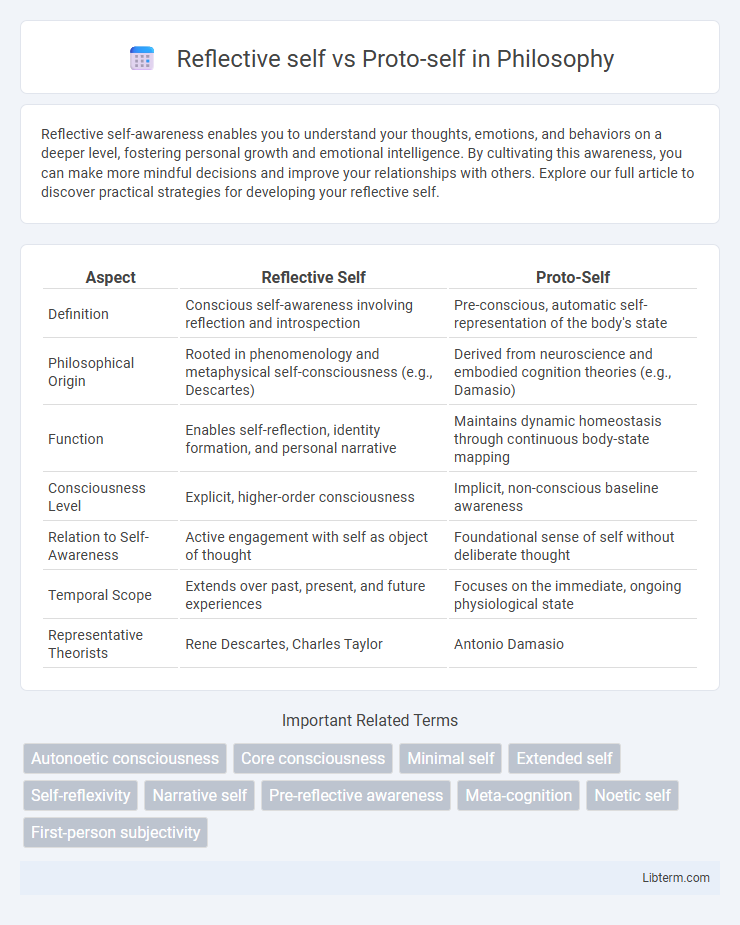Reflective self-awareness enables you to understand your thoughts, emotions, and behaviors on a deeper level, fostering personal growth and emotional intelligence. By cultivating this awareness, you can make more mindful decisions and improve your relationships with others. Explore our full article to discover practical strategies for developing your reflective self.
Table of Comparison
| Aspect | Reflective Self | Proto-Self |
|---|---|---|
| Definition | Conscious self-awareness involving reflection and introspection | Pre-conscious, automatic self-representation of the body's state |
| Philosophical Origin | Rooted in phenomenology and metaphysical self-consciousness (e.g., Descartes) | Derived from neuroscience and embodied cognition theories (e.g., Damasio) |
| Function | Enables self-reflection, identity formation, and personal narrative | Maintains dynamic homeostasis through continuous body-state mapping |
| Consciousness Level | Explicit, higher-order consciousness | Implicit, non-conscious baseline awareness |
| Relation to Self-Awareness | Active engagement with self as object of thought | Foundational sense of self without deliberate thought |
| Temporal Scope | Extends over past, present, and future experiences | Focuses on the immediate, ongoing physiological state |
| Representative Theorists | Rene Descartes, Charles Taylor | Antonio Damasio |
Understanding Reflective Self and Proto-Self
The Reflective Self involves conscious awareness, autobiographical memory, and the ability to self-reflect on past experiences, forming a coherent identity over time. In contrast, the Proto-Self represents a non-conscious, moment-to-moment representation of the body's internal states, grounding the individual's immediate sense of existence. Understanding these concepts highlights how the Reflective Self depends on cognitive processes like memory and metacognition, while the Proto-Self provides the foundational biological and affective framework for self-experience.
Evolutionary Origins of the Self
The proto-self represents the foundational, neural-based representation of the organism's internal state, serving as an evolutionary precursor to higher self-awareness found in mammals. Reflective self emerges later in evolution, marked by complex cognitive abilities such as autobiographical memory and self-reflection, primarily observed in humans and some primates. Research in neurobiology and comparative psychology highlights the proto-self's role in basic survival functions, while the reflective self underpins advanced social cognition and identity formation.
Neural Basis of Proto-Self
The neural basis of the proto-self primarily involves subcortical and brainstem structures such as the hypothalamus, thalamus, and reticular formation, which generate a continuous representation of the organism's internal physiological states. These neural networks create a foundational, pre-reflective sense of self by integrating interoceptive signals that maintain the body's homeostasis and provide the basis for subjective experience. In contrast, the reflective self depends on cortical areas, especially the prefrontal cortex, enabling higher-order self-awareness and autobiographical memory.
The Development of Reflective Self-Awareness
The development of reflective self-awareness emerges from the proto-self, which consists of pre-conscious, bodily processes that create a basic sense of being. Reflective self-awareness involves higher cognitive functions, such as autobiographical memory and metacognition, enabling individuals to recognize themselves as continuous entities across time and contexts. This evolution facilitates advanced social cognition, identity formation, and complex decision-making processes.
Distinguishing Features: Proto-Self vs Reflective Self
The proto-self represents a pre-conscious, moment-to-moment neural map of the body's physiological condition, forming the foundation for basic self-awareness. In contrast, the reflective self involves higher-order cognitive processes that enable self-reflection, introspection, and the ability to recognize oneself across time. Distinguishing features include the proto-self's automatic, sensory-based representation versus the reflective self's deliberate, language-mediated self-concept and autobiographical memory integration.
Role of Memory in Self-Construction
The Reflective self relies heavily on autobiographical memory, integrating past experiences to create a coherent personal identity and enabling self-awareness across time. In contrast, the Proto-self operates at a pre-reflective level, grounding the basic sense of self in immediate sensorimotor experiences without explicit reliance on memory. Memory serves as a critical mechanism differentiating the Reflective self's capacity for narrative continuity from the Proto-self's present-centered bodily awareness.
Emotional Regulation and the Self
The Reflective self enables advanced emotional regulation by allowing conscious evaluation and reinterpretation of feelings, enhancing self-awareness and adaptive responses. The Proto-self operates at a more fundamental level, generating basic emotional states and bodily experiences that form the foundation of selfhood. Together, these layers interact to create a dynamic interplay between automatic emotional reactions and deliberate reflective processes crucial for complex self-regulation.
Consciousness: From Proto-Self to Reflective Awareness
Consciousness evolves from the proto-self, an implicit, pre-reflective state representing the organism's moment-to-moment embodied experience, to reflective self-awareness, where the brain integrates sensory, interoceptive, and mnemonic information to create a narrative self-model. The proto-self, identified by neuroscientist Antonio Damasio, underlies the foundation of core consciousness, enabling an organism to sense its internal physiological status without explicit self-reflection. Reflective self-awareness emerges through higher-order cortical processes, particularly in prefrontal regions, allowing individuals to mentally represent themselves as continuous agents over time, supporting complex introspection, autobiographical memory, and self-concept.
Implications for Mental Health and Therapy
The reflective self, characterized by self-awareness and autobiographical memory, shapes identity and influences cognitive-behavioral therapy outcomes, while the proto-self, comprising pre-conscious bodily states, underpins emotional regulation and foundational self-experience crucial for trauma-informed approaches. Dysregulation between these selves can result in disorders such as dissociation and depression, highlighting the necessity for integrative therapeutic models that address both conscious reflection and implicit bodily awareness. Therapies incorporating mindfulness and interoceptive techniques enhance proto-self integration, promoting resilience and emotional stability in patients with complex mental health conditions.
Future Directions in Self-Research
Future directions in self-research emphasize integrating Reflective self and Proto-self frameworks to advance understanding of consciousness and identity formation. Investigating neural correlates of the Reflective self, responsible for autobiographical memory and self-reflection, alongside the Proto-self's pre-reflective bodily awareness, could reveal mechanisms underlying self-continuity and disruption in psychiatric conditions. Emerging technologies such as neuroimaging and computational modeling offer promising avenues to map dynamic interactions between these self-levels, enhancing therapeutic interventions and cognitive neuroscience theories.
Reflective self Infographic

 libterm.com
libterm.com